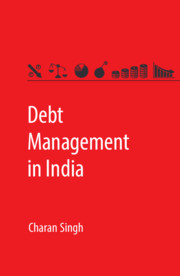Book contents
- Frontmatter
- Contents
- List of Tables and Figures
- Preface
- 1 Introduction
- 2 Public Debt in India
- 3 Ricardian Equivalence: Introduction
- 4 Ricardian Equivalence: Empirical Studies Utilising Consumption Function
- 5 Ricardian Equivalence and Consumption in India
- 6 Monetisation of Debt in India
- 7 Domestic Debt and Economic Growth in India
- 8 Separation of Debt from Monetary Management
- 9 Conclusions and Policy Implications
- Bibliography
- Index
6 - Monetisation of Debt in India
Published online by Cambridge University Press: 23 November 2018
- Frontmatter
- Contents
- List of Tables and Figures
- Preface
- 1 Introduction
- 2 Public Debt in India
- 3 Ricardian Equivalence: Introduction
- 4 Ricardian Equivalence: Empirical Studies Utilising Consumption Function
- 5 Ricardian Equivalence and Consumption in India
- 6 Monetisation of Debt in India
- 7 Domestic Debt and Economic Growth in India
- 8 Separation of Debt from Monetary Management
- 9 Conclusions and Policy Implications
- Bibliography
- Index
Summary
In India, the rising public debt has been supported by the central bank, the RBI. This trend has specially been followed since 1971. The rise in the support of the government debt by RBI has implications for the rising net-RBI credit to the government and consequently reserve money, money supply and the price level. This aspect of the rising monetised debt and its relationship with the price level has not been investigated earlier in the empirical work. The relationship between the monetised debt and the price level, and the monetary aggregates is investigated in this chapter.
In Section 6.1, an analytical model is discussed wherein the rising importance of monetised debt in the context of a small open economy is analysed. The implications derived from the Mundell-Fleming model suggest a close relationship between monetary aggregates and the price level in India. The rising trend in monetised debt and its relationship with other monetary aggregates is discussed in Section 6.2. The concept of Granger causality is briefly discussed in the next section. A brief critical review of the empirical literature on causality between the monetary aggregates and prices in India is presented in Section 6.4. The data base and the methodological issues for the causality test are discussed in Section 6.5 followed by a section on empirical results. Finally, the conclusions are presented in Section 6.7.
The analytical framework
In this section, an analytical framework on the implications of the rising monetised debt is developed. A brief review of the economic conditions prevailing in India during the period of the study is presented. This is followed by a discussion on the open economy model and the implications emerging therefrom.
The prevalent economic situation in India
The Indian economy has passed through a period of transition in the last five decades. The economic condition has changed especially since July 1991 when the current liberalisation measures were initiated. Therefore, a brief overview of the prevalent economic situation during the period, 1951 to 1995, relevant to the analysis of the open economy model, is presented in this subsection. The major relevant areas focussed in discussion are the exchange rate, capital mobility and trade restrictions, and interest rate and demand for money.
- Type
- Chapter
- Information
- Debt Management in India , pp. 145 - 183Publisher: Cambridge University PressPrint publication year: 2018



